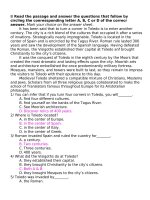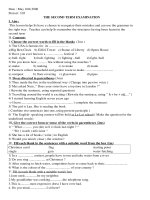ANH 10 UNIT 16
Bạn đang xem bản rút gọn của tài liệu. Xem và tải ngay bản đầy đủ của tài liệu tại đây (137.79 KB, 8 trang )
Week: Teaching date:
Period: Preparing date:
UNIT 16: HISTORICAL PLACES
VOCABULARY
Vocabulary Pronunciation Meanings
A. READING
1. historical place
[his't{rikl pleis]
di tích lòch sử
2. cultural (a)
['kÝltS±r±l]
thuộc về văn hoá
3. site (n)
[sait]
đòa điểm, nơi
4. originally (adv)
[±'ridZn±li]
nơi khởi nguồn, về nguồn gốc
5. dynasty (n)
['din±sti]
triều đại
6. representative (n)
[,repri'zent±tiv]
đại diện
7. Confucian (adj, n)
[k±n'fju:Sn]
(thuộc) nho giáo, nhà nho
8. behaviour (n)
[bi'heivj±]
cách ứng xử
9. educate (v)
['edZUkeit]
đào tạo
10. talented (a)
['tỉl±ntid]
có tài
11. memorialize (v)
[m±'mỴ:ri±laiz]
tôn vinh, tưởng nhớ
12. brilliant (adj)
['brili±nt]
lỗi lạc
13. scholar (n)
['sk{l±]
học giả
14. achievement (n)
[±'tSi:vm±nt]
thành tựu, thành tích
15. royal examination (n)
interprovincial examination
pre-court examination
['rỴi±l ig,zỉmi'neiSn]
[,int±pr±'vinSl]
thi đình
thi hương
thi hội
16. engrave (v)
[in'greiv]
chạm, khắc
17. stone stele (n) – stelae (ns)
[st±Un 'sti:li]
bia đá
18. giant (adj)
['dZai±nt]
khổng lồ
19. tortoise (n)
['tỴ:t±s]
con rùa
20. well-preserved (adj)
[wel pri'zÄ:vd]
được bảo tồn kỹ
21. traditional (a)
[tr±'diS±nl]
theo truyền thống
22. architecture (n)
['¿:kitektS±]
kiến trúc
23. banyan tree (n)
['bỉni±n]
cây đa
24. witness (n)
['witnis]
sự làm chứng
25. feudal times (n)
['fju:dl]
thời phong kiến
26. flourish (v)
['flÝriS]
phát triển, trang trí
27. pride (n)
[praid]
niềm tự hào
28. construction (n)
[k±n'strÝkSn]
công trình xây dựng
B. SPEAKING
29. Mausoleum (n)
[,mỴ:s±'li:±m]
lăng
30. late president (n)
[leit 'prezid±nt]
chủ tòch quá cố
31. Hue imperial city
[im'pi±ri±l]
Hoàng cung Huế
32. heritage (n)
['heritidZ]
di sản
33. comprise (v)
[k±m'praiz]
gồm có
34. Royal Citadel (n)
['rỴi±l 'sit±dl]
Kinh Thành
35. Imperial Enclosure (n)
[im'pi±ri±l in'kl±UZ±]
Hoàng Thành
36. Forbidden City (n)
[f±'bidn 'siti]
Tử Cấm Thành
37. admission fee (n)
[±d'miSn]
tiền vào cửa
38. Conference hall (n)
['kỴnf±r±ns hỴ:l]
phòng hội nghò
39. Reunification hall (n)
['ri:,ju:nifi'keiSn hỴ:l]
Phủ tổng thống
40. Independence Palace (n)
[,indi'pend±ns 'pỉlis]
Dinh độc lập
41. air bombardment (n)
[bỴm'b¿:dm±nt]
cuộc không tạc bằng bom
42. chamber (n)
['tSeimb±]
phòng lớn
43. maintenance (n)
['meint±n±ns]
sự trùng tu
C. LISTENING
44. Notre Dame Cathedral
[deim k±'Hi:dr±l]
nhà thờ Đức Bà
45. Ha Long Bay Vònh Hạ Long
46. The Huc Bridge
[bridZ]
cầu Thê Húc
47. Noon Gate
[nu:n] [geit]
Ngọ Môn
48. Japanese Covered Bridge
[,dZỉp±'ni:z] ['kÝv±d]
Cầu Nhật Bản
49. Assembly Hall of Cantonese
Chinese Congregation
[±'sembli] [,kỉnt±'ni:z]
['tSai'ni:z] [,kỴNgri'geiSn]
Hội quán Quảng Đông
50. Ancient town of Hoi An
['einS±nt] [taUn]
phố cổ Hội An
51. merchant (n)
['mÄ:tS±nt]
thương gia
52. pillar (n)
['pil±]
cột
53. carve (v)
[k¿:v]
khắc, chạm
54. destination (n)
[,desti'neiSn]
nơi đến
55. vessel (n)
['vesl]
thuyền lớn
56. ornamental (adj)
[,Ỵ:n±'mentl]
trang hoàng
57. certify (v)
['s±:tifai]
chứng nhận
58. Far East (n)
[f¿:(r) i:st]
viễn đông
59. thatch-roofed (adj)
[HỉtS] [ru:ft]
lợp bằng, rơm, rạ
60. tile-roofed (adj)
[tail] [ru:ft]
lợp ngói
61. UNESCO (United Nations
Educational, Scientific and Cultural
Organization)
[ju:'nesk±U]
Tổ chức Giáo Dục, Khoa Học
và Văn Hoá của LHQ
62. characteristic (n)
[,kỉr±kt±'ristik]
đặc tính, đặc điểm
D. WRITING
63. describe (v) = description (n)
[dis'kraib] [dis'kripSn]
miêu tả
64. chart (n)
[tS¿:t]
biểu đồ
65. increase (v, n)
['inkri:s]
tăng, sự tăng lên
66. decrease (v, n)
['di:kri:s]
giảm, sự giảm sút
E. LANGUAGE FOCUS
67. comparative (a)
[k±m'pỉr±tiv]
so sánh hơn
68. superlative (a)
[sju:'pÄ:l±tiv]
so sánh nhất
69. pleasure (n)
['pleZ±]
niềm vui thích
70. measure (n)
['meZ±]
sự đo lường
71. illusion (n)
[i'lu:Zn]
sự ảo tưởng
72. massage (n)
['mỉs¿:Z]
sự xoa bóp
73. Swedish (n)
['swi:diS]
người Th Điển
74. dangerous (a)
['deindZr±s]
nguy hiểm
75. passenger (n)
['pỉsindZ±]
hành khách
76. plane (n)
[plein]
máy bay
77. transport (n)
['trỉnspỴ:t]
sự chuyên chở
78. solution (n)
[s±'lu:Sn]
giải pháp
79. obviously (adv)
['{bvi±sli]
rõ ràng
80. mean (n)
[mi:ns]
phương tiện
81. healthy (a) >< unhealthy (a)
['helHi]>< [Ýn'helHi]
khoẻ mạnh >< ốm yếu
GRAMMAR:
I. COMPARISONS. (CÁC HÌNH THỨC SO SÁNH)
1. Equal comparisons (So sánh bằng)
a. With adjectives:
Ex1: I am as tall as he is.
2: She is as beautiful as her sister.
b. With adverbs:
Ex1: He runs as fast as I do
2: She writes as carefully as me
2. Comparatives (So sánh hơn)
* With adjectives:
a. With short adjectives: (Với tính từ ngắn)
Ex: John is stronger than his brother.
Notes:
- Cách nhận biết tính từ ngắn:
+ Tính từ có một âm tiết: fast, strong, small, long …
+ Tính từ có hai âm tiết kết thúc bằng “y, ow, le, er”. Ex: happy, narrow, simple, clever …
- Quy tắc thêm “er” cho tính từ ngắn:
+ Tính từ ngắn có một âm tiết mà kết thúc bằng một phụ âm trước phụ âm đó là một nguyên âm thì ta
nhân đôi phụ âm cuối rồi thêm “er” khi sang so sánh hơn: big > bigger, hot > hotter…
+ Tính từ ngắn kết thúc bằng nguyên âm “e” thì thêm “r” khi sang so sánh hơn: simple simpler …
+ Tính từ ngắn kết thúc bằng “y” thì biến “y” thành “i + er” khi sang so sánh hơn: happy happier …
b. With long adjectives: (Với tính từ dài)
Ex: This problem is more difficult than we thought. (Vấn đề này khó hơn chúng ta nghó.)
* With adverbs:
a. With short adverbs: (Với trạng từ ngắn)
Ex: John runs faster than his brother.
Notes: - Cách nhận biết trạng từ ngắn: chính là các tính từ ngắn
S
1
+ be + adj-er + than + S
2
+ be
O
S
1
+ be + more + adj + than + S
2
+ be
O
* Affirmative: S
1
+ be + as + adj +as + S
2
+ be
O
* Negative: S
1
+ be + not + as/so + adj + as + S
2
+ be
O
* Interrogative: Be + S
1
+ as + adj + as + S
2
+ be?
O
* Affirmative: S
1
+ V + as + adv +as + S
2
+ Aux.
O
* Negative: S
1
+ Aux. + not + V + as/so + adv + as + S
2
+ Aux.
O
* Interrogative: Aux. + S
1
+ V + as + adv + as + S
2
+ Aux.?
O
S
1
+ V + adv-er + than + S
2
+ Aux.
O
- Trạng từ dài là: adj + ly adv như: careful + ly carefully …
b. With long adverbs: (Với trạng từ dài)
Ex: He drives more carefully than his brother.
3. Superlatives: (So sánh nhất)
* With adjectives:
a. With short adjectives: (Với tính từ ngắn)
Ex: John is the strongest in his family.
Note: - Quy tắc thêm “est” cho tính từ ngắn:
+ Tính từ ngắn có một âm tiết kết thúc bằng một phụ âm mà trước phụ âm đó là một nguyên âm ta
nhân đôi phụ âm cuối và thêm đuôi “est” khi sang so sánh nhất: hot hottest …
+ Tính từ ngắn kết thúc bằng nguyên âm “e” thì thêm “st” khi sang so sánh nhất: simple simplest …
+ Tính từ ngắn kết thúc bằng “y” thì biến “y” thành “i + est” khi sang so sánh nhất: happy happiest …
Ex: Yesterday was the hottest day of the year.
b. With long adjectives: (Với tính từ dài)
Ex: This exercise is the most difficult in unit 16.
* With adverbs:
a. With short adverbs: (Với trạng từ ngắn)
Ex: John runs the fastest in his class.
b. With long adverbs: (Với trạng từ dài)
Ex: My father drives the most carefully in my family.
4. Irregular adjectives and adverbs: (Tính từ và trạng từ bất qui tắc)
Adjectives/ adverbs Comparative Superlative
good/well (tốt) better the best
bad/badly (xấu, dở) worse the worst
far (xa) farther / further the farthest / the furthest
much/ many (nhiều) more the most
little (ít) less the least
Ex: Her English is better than mine. (Tiếng Anh của cô ta thì tốt hơn tôi.)
EXERCISES
Exercise 1: Complete the following sentences with the appropriate form of the words in brackets.
1. Learning to speak a language is often much (easy) __________________ than learning to write it.
2. This hotel must be (expensive) __________________ than the small one next door.
3. An orange is (large) __________________ than a plum.
4. He is certainly (unusual) __________________ person I have ever met.
5. Bringing up children is one of (hard) __________________ jobs in the world.
6. His latest film was (interesting) __________________ than his previous ones.
7. What is (difficult) __________________ thing you have ever done?
S + be + the + adj-est + (N) …
S + be + the most + adj + (N) …
S
1
+ V + more + adv + than + S
2
+Aux.
O
S + V + the + adv-est + (N) …
S + V + the most + adv + (N) …
8. When I saw her, she looked much (thin) __________________ than I remembered her.
9. Losing your credit card is (bad) __________________ than losing your money.
10. This is (fast) __________________ car we produce.
Exercise 2: Complete the following sentences, using the cues below.
1. A mouse/ a cat/ small.
2. A radio/ a television/ cheap.
3. The sun/ the moon/ big.
4. A mountain/ a hill/ high.
5. Your hair/ my hair/ long.
6. French food/ English food/ good.
7. Love/ money/ important.
8. This chair/ that chair/ comfortable.
9. A dog/ a chicken/ intelligent.
10. This lesson/ that one/ difficult.
11. A rose/ a weed/ beautiful.
12. This book/ that book/ interesting.
Exercise 3: Change the given adjectives into adverbs and complete these sentences.
1. Linda can type ______________________________ than last year. (quick)
2. He can play football ______________________________ than last year. (good)
3. They can speak English ______________________________ than last year. (fluent)
4. Paul can do his homework ______________________________ than last year. (careful)
5. He is ______________________________ than last year. (hard-working)
6. She becomes ______________________________ than yesterday. (happy)
7. I prepare my lessons ______________________________ than last week. (careful)
8. He has to work a lot _____________________________ in this new job than that one last year. (hard)
9. She dances ______________________________ than last year. (graceful)
10. Today the weather is ______________________________ than it was yesterday. (nice)
11. Kate got home ______________________________ than Alice did. (late)
12. I finished my work ______________________________ than Tom did. (quick)
13. Mary sings ______________________________ than Margaret does. (beautiful)
14. This exercise is ______________________________ than that one. (easy)
15. Alice speaks ______________________________ than I do. (loud)
Exercise 4: Complete the following sentences, using the correct adjectives form.
1. ______________________________ city in Canada is Toronto. (large)
2. The Nile is ______________________________ river in the world. (long)
3. February is ______________________________ month of the year. (short)
4. I think health is ______________________________ thing in life. (important)
5. Mt. Everest is ______________________________ mountain in the world. (high)
6. This exercise is ______________________________ of all. (difficult)
7. ______________________________ reason of the year is spring. (beautiful)
8. Russia is ______________________________ country in the world. (large)
9. Chinese is ______________________________ of those three languages. (difficult)
10. Ho Chi Minh City is ______________________________ one in population. (big)
Exercise 5: Complete sentences, using equal comparisons.
1. John is ______________________________ his brother. (tall)
2. Our flat is ______________________________ yours. (large)
3. He is not ______________________________ his sister. (intelligent)
4. She sings ______________________________ she plays. (beautiful)
5. He doesn’t speak English ______________________________ his sister. (good)
6. Her voice is not ______________________________ yours. (good)
7. Helen doesn’t prepare her homework ______________________________ she should. (careful)
8. We visit them ______________________________ we can. (often)
9. He didn’t arrive ______________________________ we thought. (early)
10. I came ______________________________ possible. (soon)
Exercise 6: Finish the second sentences so that they will have the same meaning as the preceding.
Form: S
1
+ be + adj-er/ adv-er + than + S
2
= S
2
+ be + not + so/as + adj + as + S
1.
V more + adj/ adv Aux.+ not + V adv
1. Khanh is more beautiful than Nguyet.
Nguyet is not
2. This house is bigger than that one.
That house is
3. London is more crowded than Hanoi.
Hanoi is not
4. Mai learns better than Cuc.
Cuc doesn’t
5. Nhan was richer than Nghia.
Nghia was not
6. Hong is thinner than Huong.
Huong is not
7. Ha is more careful than Minh.
Minh is not
8. Thang is older than Tho.
Tho is not
9. Tuyet worked harder than Nga.
Nga did not
10. Trien runs faster than Ve.
Ve doesn’t
KEY:
Exercise 1: 1. easier 2. more expensive 3. larger 4. the most unusual 5. the hardest
6. more interesting 7. the most difficult 8. thinner 9. worse 10. the fastest
Exercise 2:
1. A mouse is smaller than a cat. 2. A radio is cheaper than a television.
3. The sun is bigger than the moon. 4. A mountain is higher than a hill.
5. Your hair is longer than my hair. 6. French food is better than English food.
7. Love is more important than money. 8. This chair is more comfortable than that chair.
9. A dog is more intelligent than a chicken. 10. This lesson is more difficult than that one.
11. A rose is more beautiful than a weed. 12. This book is more interesting than that book.
Exercise 3: 1. more quickly 2. better 3. more fluently 4. more carefully
5. more hard-working 6. happier 7. more carefully 8. harder
9. more gracefully 10. nicer 11. later 12. more quickly
13. more beautifully 14. easier 15. more loudly
Exercise 4: 1. the largest 2. the longest 3. the shortest 4. the most important
5. the highest 6. the most difficult 7. the most beautiful 8. the largest
9. the most difficult 10. the biggest
Exercise 5: 1. as tall as 2. as large as 3. as intelligent as 4. as beautifully as
5. as well as 6. as good as 7. as carefully as 8. as often as
9. as early as 10. as soon as
Exercise 6:
1. Nguyet is not so beautiful as Khanh. 2. That house is not as big as this house.
3. Hanoi is not so crowed as London. 4. Cuc doesn’t learn so well as Mai.
5. Nghia was not so rich as Nhan. 6. Huong is not as thin as Hong.
7. Minh is not so careful as Ha. 8. Tho is not so old as Thang.
9. Nga didn’t work as hard as Tuyet. 10. Ve doesn’t run so fast as Trien.
…………………………………………………………………………………………………
Week: Preparing date:
Period: Teaching date:
GENERAL EXERCISES OF UNIT 16
A. TÖÏ LUAÄN.
I. Give the correct form of the verbs.
1. I (know) _____________________ him since our schooldays.
2. Five thousand dollars (be) _____________________ a big sum.
3. If he (study) _____________________ a little harder, he would pass the test.
4. Neither his friends nor he (go) _____________________ to the concert tonight.
II. Complete the following sentences using the given words
5. They/ eat/ less/ vegetables/ meat.
6. What/ large/ city/ your country?
7. There/ more visitors/ March/ April.
III. Complete the second sentences so that it has a similar meaning to the first one.
8. Liz drinks more milk than George.
George doesn’t
9. Rachael doesn’t cooks as well as Helen.
Helen cooks
10. My father is taller than yours.
Your father
B. TRAÉC NGHIEÄM
I. PHONETIC
Choose the word in each group that has the underlined part pronounced differently from the rest.
1. a. university b. sugar c. sell d. sometimes
2. a. machine b. merchant c. Chinese d. chamber
Choose a word in each line that has different stress pattern.
3. a. mausoleum b. memorialize c. Confucius d. achievement
4. a. existence b. architecture c. imperial d. construction
II. VOCABULARY- GRAMMAR
5. He takes no pride _________________ his work.
a. up b. in c. for d. with
6. More and more foreign tourists arrive _________________ Vietnam.
a. at b. for c. along d. in
7. Quoc Tu Giam is _________________ first university of _________________ Vietnam.
a. a/ no article b. the/ no article c. no article/ the d. a/ the
8. He became internationally famous at the age of twenty for his novels and poetry.
a. well-informed b. well-known c. well-done d. well-educated
Keys:
A. I. 1. have known 2. is 3. studied 4. goes
II. 5. They eat less vegetables than meat.
6. What is the largest city in your country?
7. There were more visitors in March than in April.
III. 8. George doesn’t drink as much milk as Liz.
9. Helen cooks better than Rachael.
10. Your father isn’t as tall as mine/ my father.
B. 1. b 2. a 3. a 4. b 5. b 6. d 7. b 8. b









